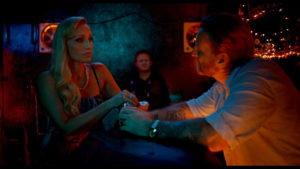Purposeful films are often harder to view, or critique, than films of chronology or substance. This is especially true with revenge films. Quentin Tarantino’s “Kill Bill” is an example of a good film that uses revenge as its motive and camera shots, violence, and exposition to tell its story. The 2010 reboot “I Spit on Your Grave” is an example of a bad film, a movie that uses its violence not as art, but as evidence of a world devoid of innocence and decency in which we should find pleasure in rapists being brutalized in equal measure to their victims. Nicholas Winding Refn’s “Only God Forgives” has more in common with the former; it’s beautifully shot, and beautifully scored. Unfortunately, the film sells its exposition for its gorgeous style, and is infused with bloody violence and a lack of morals that comes off as little more than bitter desperation.
The setting for the film is Bangkok, and tells the story of Billy (Tom Burke) and Julian (Ryan Gosling), two American brothers who are drug dealers in the criminal underworld and run an underground boxing ring. The film’s description portrays it as a tale of brotherly love and revenge; however, we quickly see things are not so black and white. In quick sequence Billy rapes and murders a 16-year-old prostitute, and is captured by a ruthless detective (Vithaya Pansringarm) who entices the girl’s father to murder Billy before cutting off the man’s hand as a warning to protect his remaining children. Julian questions the man for his motive and lets him go. However, it isn’t long before Julian’s unforgiving mother Crystal (an excellent Kristin Scott Thomas) arrives with her eyes set upon the revenge Julian is seemingly ill equipped to exact.
What “Only God Forgives” has going for it is convincing acting and an eerie filming style, courtesy of cinematographer Larry Smith. It’s clear Refn and Smith have infused a Kubrickian style into this film, from shots of long, abandoned corridors reminiscent of The Overlook Hotel in “The Shining” to the dramatic and haunting score of classical organs and modern synthesizers that practically exudes Kubrick’s swan song, “Eyes Wide Shut.” The movie is cloaked in darkness and highlighted with oranges, reds, and neons. The effect is singular and captivating, presenting a milieu that subtly begs our attention.

The film’s dialogue is limited, however, used at times to make attempts at profound meaning, while other times for little more than to shock or offend. Early scenes between the ruthless Chang and his 4-year-old daughter are poignant as the man hints that violence is the only way to control others, while she innocently implies polite discussion can achieve harmony. However, later scenes are less effective, and are at times overly prosaic or purposefully crass.
The worst offender of this is Julian’s mother. To a young girl working the front desk of a hotel she bleeds intolerance and entitlement with speech that belies a woman used to getting what she wants often before she asks. However later scenes are just purposefully cruel, as she emasculates Julian at dinner, cutting him down with remarks better suited a bitter enemy than her own son. In response to why he tolerates the abuse Julian remarks only, “She’s my mother,” blurring the edges of reality even further. There’s a past between Julian and Crystal lurking in the shadows of this film, but it seems Refn wants us only to be shocked and offended by their relationship rather than to understand.
The biggest problem with “Only God Forgives” lies in the increasing impossibility to sympathize with any of the characters. The theme of a mother’s love is certainly understandable — but this wanes considerably as we realize Billy is a complete scoundrel devoid of morals. In fact, there are only two men in the film who bat an eyelid at the passing of the murdered girl – Julian, who refuses to kill his brother’s murderer when he finds out what he did, and Chang. However, the film doesn’t mean to remark on the terribleness of this girl’s death, but only on the nature of revenge. Both Chang and Crystal work their way through the guilty parties, culminating with an anticlimactic fist fight between Chang and Julian that ends in a head scratching way.
At the end of the day, “Only God Forgives” is a difficult film to review. The film is purposeful, its shots beautiful, and its acting brilliant. However, its characters are so unlikeable that many viewers will be left with a big ‘who cares?’ at the movie’s conclusion. This is the kind of film that will be revered for its style, lighting, and soundtrack, a result that will alienate many looking for an underlying moral, which never becomes apparent. With more character development and dialogue, and less self-congratulatory brutality, “Only God Forgives” could have made a definitive statement. Perhaps its strongest failure lies in the fact that it could have been more.
– by Mark Ziobro
1 Comment
I think you miss the point of the film . It’s a beautiful revenge tale nothing more nothing less.